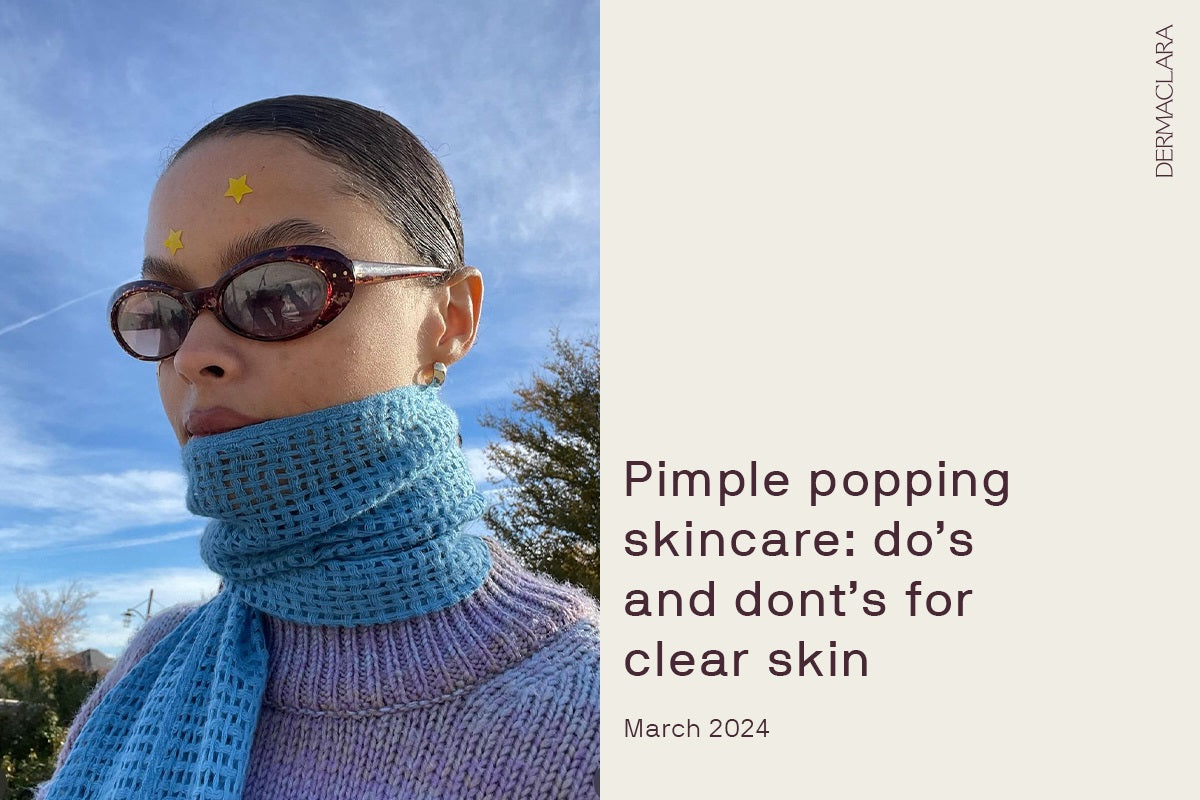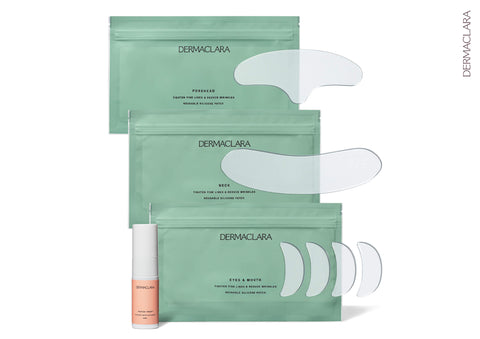Pimple Popping: Skincare Do’s and Don’ts for Clear Skin

To pop or not to pop? That is the question! Pimples are so frustrating and even more difficult to resist popping. So, what do you do? Below, we explore the right and wrong ways to deal with pimples, aiming to help you achieve clearer, healthier skin without causing harm.
Should You Pop Pimples?
The big question: Is popping pimples bad? It's something many of us wonder when we spot a blemish. Dermatologists usually say no to popping because it can cause more harm than good. But sometimes, it might be okay if done carefully–more on that below!
What Happens When You Pop a Pimple?
When you pop a pimple, you're essentially forcing the contents—pus, bacteria, and oil—out of the follicle. While this might provide temporary relief and the satisfaction of seeing the gunk expelled, it can have unintended consequences.
Dangers of Popping Pimples
The act of popping a pimple causes increased irritation and inflammation. So, even though you were just trying to clear your face, you wind up causing redness, swelling, and even more pain. Aggressively popping pimples can also damage the delicate tissues surrounding the pimple, resulting in scarring or hyperpigmentation.
In some cases, popping pimples can also introduce bacteria into the skin, leading to infection. This can manifest as increased swelling, warmth, tenderness, and the formation of pus-filled lesions. Left untreated, these infections can worsen and may require medical intervention.
When to Pop a Pimple?
Timing is key when it comes to popping pimples. While it's generally best to avoid popping altogether, there are instances when it may be appropriate. If a pimple has developed a visible white or yellow head, it may be ready to be gently extracted. However, if the pimple is inflamed, painful, or deeply rooted, it's best to leave it alone.

How to Pop a Pimple
If you've decided to pop a pimple, it's crucial to do it correctly to minimize damage to your skin. Start by washing your hands and cleansing the area around the pimple with a gentle cleanser. Then, use a clean tissue to apply gentle pressure around the base of the pimple. Avoid using your nails or squeezing too hard, which can lead to trauma and increased inflammation. If the pimple doesn't pop easily, it's best to stop and leave it alone rather than forcing it.
How to Use a Pimple Popping Tool
The best way to pop a pimple is with a pimple popping tool or comedone extractor. These tools can help extract stubborn pimples without causing excessive trauma to the skin. Before using a pimple-popping tool, sterilize it with rubbing alcohol to prevent the spread of bacteria. Then, gently place the looped end of the tool around the pimple and apply light pressure. If the pimple doesn't pop after a few gentle attempts, it's best to stop and try again later rather than risk damaging your skin.
What to Do After Popping a Pimple?
After popping a pimple, taking proper care of the affected area is essential to promote healing and prevent further irritation or infection. Here's what you should do:
- Cleanse Gently: Wash the area around the popped pimple with a mild cleanser. Avoid harsh scrubbing or rubbing, as this can further irritate the skin.
- Apply a Soothing Toner: After cleansing, apply a gentle toner to help balance the skin's pH levels and soothe any redness or inflammation.
- Moisturize: Apply a non-comedogenic moisturizer to hydrate the skin and prevent dryness. Look for a moisturizer that contains soothing ingredients like aloe vera or hyaluronic acid.
- Protect with SPF: Apply a broad-spectrum sunscreen with SPF 30 or higher to protect the freshly popped pimple from sun damage and prevent hyperpigmentation.
- Avoid Touching: Resist the urge to touch or pick at the popped pimple, as this can introduce bacteria and delay healing.
How to Heal a Popped Pimple
Below are some options for what to put on a popped pimple to help it heal and prevent infection.
- Benzoyl Peroxide: Benzoyl peroxide can help kill acne-causing bacteria and reduce inflammation. Apply a thin layer to the popped pimple and surrounding area.
- Salicylic Acid: Salicylic acid exfoliates the skin and unclogs pores, helping to prevent future breakouts. Use a spot treatment containing salicylic acid to target the popped pimple.
- Tea Tree Oil: Tea tree oil has natural antibacterial properties and can help reduce inflammation. Dilute tea tree oil with a carrier oil like jojoba or coconut before applying it to the skin.
- Calamine Lotion: Calamine lotion has soothing properties that can help reduce redness and irritation. Apply a thin layer to the popped pimple and leave it on overnight.
Pimple Healing Magic: Dermaclara
Dermaclara silicone face patches are the best way to heal popped pimples and prevent scarring. Our patches create a protective barrier over the skin, allowing it to heal faster while minimizing the risk of infection. After cleansing the skin, apply a Dermaclara patch directly over the popped pimple and leave it on for several hours or overnight. The patch will absorb excess oil and pus while promoting healing. Replace the patch as needed until the pimple has fully healed.

Does Popping Pimples Leave Scars
Popping pimples can indeed leave scars. When you pop a pimple, you risk causing trauma to the skin, which can lead to scarring. Additionally, picking at scabs or repeatedly squeezing the same area can exacerbate scarring. To minimize the risk of scarring, avoiding aggressive popping and allowing pimples to heal naturally whenever possible is crucial. If scarring does occur, various treatments are available, including laser therapy, chemical peels, and microneedling, that can help improve the appearance of scars over time.
When Should I Be Worried About a Popped Pimple?
Usually, a popped pimple might look red, swollen, and a bit sore right after you pop it. But if it gets more swollen, feels warm, or hurts a lot, it could mean there's an infection. Other signs of infection include pus coming out, having a fever, or feeling sick. If you notice any of these signs, it's important to see a doctor to get the right treatment and prevent any problems.
When to See a Dermatologist About a Popped Pimple?
If you're not sure how to treat a popped pimple or if it's causing you any worries, it's a good idea to see a dermatologist. They can give you advice on how to care for your skin and prevent more pimples or scars in the future.
Now you have all the info you need for the next time a pimple begins to arise (at the worst possible moment). You can face the pimple head-on and challenge yourself not to touch it…or you can mess with it and use the tools you learned here to help it heal.
Leave a comment